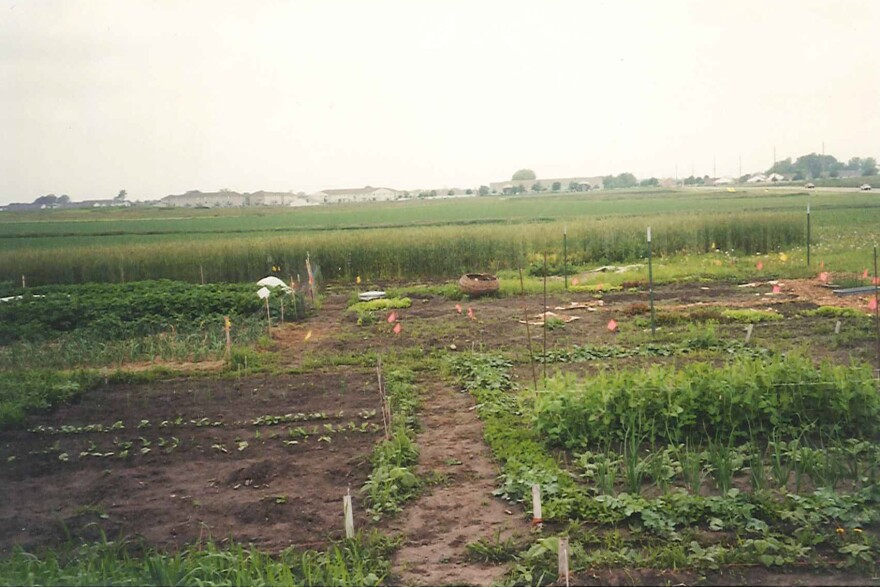A weathered wooden shed that holds wheelbarrows, hoes and other basic tools is the beacon of the Student Organic Farm, a two-acre swath within the Iowa State University Horticulture Research Farm. On a warm spring evening, a half-dozen students gather here, put on work gloves and begin pulling up weeds from the perennial beds where chives, strawberries, rhubarb and sage are in various stages of growth.
About 20 years ago, as small-scale farms on the coasts began luring shoppers with fresh produce at farmers markets and through community supported agriculture (CSA), the trend also took root here in the heartland. Every season since, CSA members drawn from the Iowa State community have enjoyed weekly boxes of fresh produce throughout the growing season. Student members can get a discounted subscription price if they work three hours a week in the field.

"I knew farming was a big thing, but I didn't know how passionate I (would) become for physical work," said culinary science major Heidi Engelhardt.
So passionate, she's now the outreach coordinator for the farm. Engelhardt said within her major, she's unusual for getting her hands in the dirt.
"People want to work in kitchens and they want to work in big cities," she said, "and that is important, but it's also important to have that farming aspect and I think I'm very lucky to have discovered that."
On this evening, most of the students come from the Iowa State agronomy department. The farm has two faculty advisors. One is from horticulture, the department here usually associated with growing fruits and vegetables.
The other farm advisor is Mary Weidenhoeft from the agronomy department. She said the appeal of working on the farm can be independent of academic interests.
"It's hands-on learning, it's just-in-time learning, it's eating what you've just learned to do," Wiedenhoeft said. "And so that's why the student organic farm is really unique."
This farm emerged in the late 1990s in response to a class about sustainable agriculture and became one of the area's first to use the CSA model. Since then, it's moved from an on-campus plot to this permanent location. As the farm grew, so did academic interest in sustainability. Now the university offers a graduate degree in sustainable agriculture.
Wiedehoeft said even though large-scale production of corn and soybeans can seem to be the primary crop interests on this campus, the organic farm is wholly embraced. She's a member of the student farm's CSA and so is the chair of the agronomy department.
"People tend to think [agronomy] is pretty conventional," she said. "I have to tell you that we're not as conventional as some people think."
For some agronomy students who plan to return to a family farm, a vegetable operation could be a new enterprise they bring back, Wiedenheoft said.
But on this night, most of the students dumping handfuls of weeds into a wheelbarrow for the compost have not grown up on farms. Riley Madole has the one paid job here, as the summer farm manager. It's the kind of work he'd like to pursue after he graduates in December.
"Not a lot of people in agronomy are going in my direction," he said, "whether it be straight organic or just reduced pesticide use."

But while he counts himself as rare in the department, he echoes Wiedenhoeft's sentiment, saying the faculty encourage various approaches to farming.
"A lot of teachers here are emphasizing that the way we've been doing it is not necessarily the right way," he said. "And we need to be open to change sometimes."
Running this farm, students learn to grow food, manage a business and recruit others to get involved. They also donate their surplus produce to area residents in need. And they come to appreciate new-to-them foods. Senior Becca Clay joined the farm her first semester on campus.
"I went out and harvested some Brussels sprouts and they're now my favorite vegetable," she said.
Engelhardt has learned how to incorporate fresh herbs into her cooking. And for grad student Kati Togliatti, the discovery was bright red.
"I really like beets," she said. "We got them in our box last year. I've never had them before because they're red, and an odd color, but they're really good."
This season the students will grow about 40 different fruits, vegetables and herbs. Then they'll cultivate interest in food crops among the fresh batch of Iowa State students who sprout up in Ames come fall.





